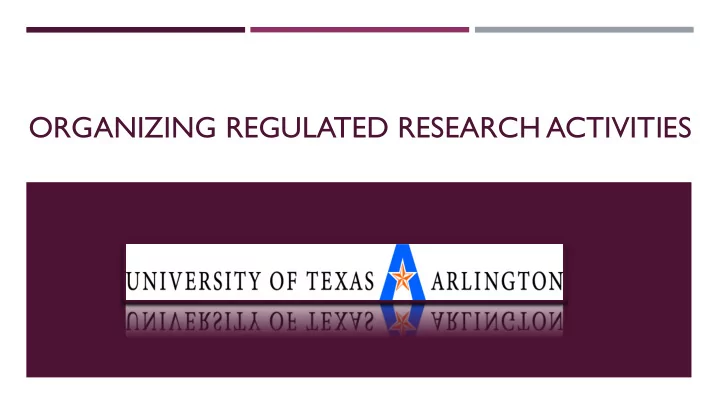

ORGANIZING REGULATED RESEARCH ACTIVITIES
ORGANIZING REGULATED RESEARCH ACTIVITIES Research Involving Human Subjects (IRB) Research Involving Animals (IACUC)
HUMAN SUBJECT RESEARCH – SINGLE IRB REVIEWS HSR requires IRB review Options to avoid duplication of effort OHRP: “Institutions may enter into joint review arrangements, rely upon the review of another qualified IRB, or make similar arrangements to avoid duplication of effort” NIH (effective May 2017): “Expectation that a single IRB (sIRB) of record will be used in the ethical review of non-exempt human subjects research protocols funded by the NIH that are carried out at more than one site”
HUMAN SUBJECT RESEARCH – RELIANCE AGREEMENTS Determine IRB of record IRB Reliance Agreement UT System “Reciprocity” Agreement (UT + Others) Acknowledgement Process
HUMAN SUBJECT RESEARCH – DETERMINING IRB OF RECORD Where will the work take place? (site requirements – access to facilities or subjects) Where are the subjects? (local or institutional policies – patients, employees, etc.) Who is the funding recipient? (sponsor obligations) Who is engaged? (Determines protocol personnel and perhaps site responsibility – intervention, interaction, or access to/receipt of identifiable data)
ANIMAL RESEARCH – SINGLE IACUC REVIEW Work involving live animal vertebrates requires IACUC Review Options to avoid duplication OLAW: “The approval of more than one IACUC is not required if the grantee and performance site(s) have Assurances; the institutions may exercise discretion in determining which IACUC reviews research protocols and under which institutional program the research will be conducted.” Determine IACUC of Record Written agreement, MOU
ANIMAL RESEARCH – DETERMINING IACUC OF RECORD Where will the work take place? (site requirements – training, OHS) Where are the animals? (local or institutional policies – housing space, animal care) Who is the funding recipient? (sponsor obligations) Who is engaged? (Determines protocol personnel and perhaps site responsibility – work with live vertebrate animals)
REGULATORY SERVICES We are here to help!!! Center for Innovation 202 E. Border St., Suite 300 817-272-3723 regulatoryservices@uta.edu Open Office Hours: Every Thursday, 9:00am – 11:00am
RESEARCH COLLABORATION – BASIC CONSIDERATIONS What is the purpose of the collaboration? Sponsored / Funding Generate Pilot Data Partnership Data sharing Internal or external
RESEARCH COLLABORATION – BASIC CONSIDERATIONS Who is collaborating? Individuals Organizations What is being shared? Data Ideas Materials How will it be shared?
RESEARCH COLLABORATION – BASIC CONSIDERATIONS Authority and Process Approval to perform activity (supervisor) Use or commitment of University resources (institutional approval) Space, renovations, or access to special equipment (what is required for success) Sustainment of commitments Regulatory Requirements
RESEARCH COLLABORATION – AGREEMENT TYPES Sponsored Research Agreement Statement of Work Subcontractors / Subrecipients / Vendors / Consultants Memorandum of Understanding Non Disclosure Agreements Collaborative Research Agreements Material Transfer
RESEARCH COLLABORATION – AGREEMENT TERMS Publication Rights • Confidentiality • Intellectual Property • Data Ownership • Deliverables • Financial Management • Liability / Indemnification • Use of Results •
RESEARCH COLLABORATION – AGREEMENT CONTACTS Sponsored Funding (Proposals and Awards) Office of Grant and Contract Management (ogcs@uta.edu) Intellectual Property (License Agreements) Office of T echnology Management (otm@uta.edu) Other Research Collaboration Agreements Agreement Manager – Dan Vincenzo (vincenzo@uta.edu) THANK YOU – Jeremy Forsberg, Assistant Vice President for Research (j.forsberg@uta.edu)
Recommend
More recommend